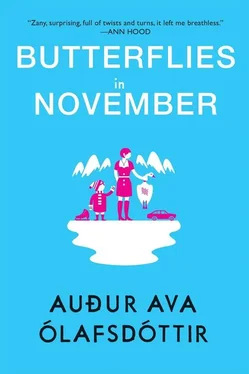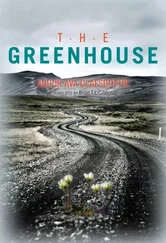We also buy some new rain gear, thick sweaters and two pairs of leggings for the boy, a Barbie and Ken set with a caravan, cat food and rubber toys for the kitten, a football, colouring book and colours, a jigsaw, crossword magazine, several women’s magazines, some towels and swimming trunks and a set of red Christmas lights that work on batteries to put on the deck. I get Tumi to try on a pair of blue hiking boots with laces and he is allowed to walk around the store in them. I also buy him a new pair of boots, which are only available in size 26, so they should last him a good while.
I gently throw him the ball in the toy section, aiming for his arms. He creates a hollow for the ball to fall into by pressing his elbows against his stomach and holding out his hands, as I try to gauge the distance and amount of force required for him to catch it before tossing the ball, which draws a small arch in the air, like a film in slow motion. But he misses the ball, which rolls into the underwear and socks department. I’ll do it better next time and crouch down on my knees. I can manage playing with a child now, but he can’t manage playing with an adult.
I ask them if they have any bicycles with training wheels and am informed that there might be a red one in the warehouse left over from the summer.
“Because it’s winter here now,” the man at the warehouse explains to me, as if I were mentally challenged. I use the opportunity to order three gas heaters for the chalet.
Tumi is mesmerized by the sight of a small Santa Claus costume in the clothes corner and asks me questions I don’t quite know how to answer. It seems to be more or less the right size so we throw it into the basket.
“You can be Santa Claus’s assistant,” I say, although I’m not sure he understands me.
The Christmas books are in and I chuck them into the basket, practically buying all of them, with the exception of autobiographies, self-help books and a study on the genealogy of Icelandic horses. I place a novel that is set in the rain on top of the pile. It has a nice cover, but I’m not familiar with the author, nor, needless to say, is the shop manager, because only two copies of it have been ordered and it lay at the back of two towers of expected best-sellers. I also buy a book about the volcanic eruption of Mount Laki in the eighteenth century, some crime pulp fiction in English and a load of easy-to-read children’s books for the boy, as well as some copybooks for him to write his foggy window words in.
With the help of the store manager, I find a book on the rearing of boys. I merely need to skim through the book and browse through the headings, captions and blurb on the jacket to realize that what the boy needs, above all else, is a strong male role model. I might be able to teach him how to catch a ball and cycle, and to fry pancakes, tie his shoelaces and read, if he hasn’t taught himself already, and even to count up to five in Hungarian, but I can’t teach him the value of words, how to be strong in spite of oneself or how to fight an enemy army.
We’ve almost filled two carts by now; he pushes one, I the other. He shows a lot of responsibility towards the home and is very attentive, pointing at the things we need here and there and fetching raisins, rice, spaghetti, yogurt, eggs, marinated herring, cottage cheese, caviar, stone-baked flat bread, smoked meat, olives, brawn, eggs, smoked salmon and cod liver oil — he’s got quite a broad palate for a four-year-old. He also finds jars of vitamin tablets and helps me to find vegetables to make meat soup. There are four types: red cabbage, carrots, turnips and potatoes. The turnips are 1,000 percent more expensive here than in Krakow. Then he returns with some perfume to give me and puts it in the trolley. I allow him to and take my place in the queue in front of the meat counter.
People prolong their shopping to observe us, not least the boy, the pair of us. Tumi looks at me apprehensively, signalling with his eyes that I’m not allowed to stare back at them, not to make an issue of it. Three people ask me if I’m the woman with the mobile summer chalet. Most of them are quite friendly and nudge their children to encourage them to offer Tumi some sweets. Digging into the green cellophane bags they’re clutching in their hands, they hesitantly choose something that might have accidentally fallen into the mix, either too strong or too bitter, before formally handing it over to him with their sticky fingers.
Just as I’m about to reach the top of the queue, something rolls on the floor and the shoppers shift their gazes off the new arrivals to form a semicircle and look down at something glistening on the floor. It’s a brown button.
The shop assistant is trying to hand a woman a parcel of weighed meat over the counter, but she’s been distracted. Who lost that button?
Concerned and solicitous looks flash across people’s faces and inquisitive glances are exchanged, before all eyes settle on me. Virtually no one is dressed in clothes that have buttons; everyone is wearing comfortable and loose-fitting garments with elastic around the waist and ankles. Many of these villagers are related, but it is somehow deemed unseemly to behave in an overly familiar manner in the local co-op. It takes considerable practice to be able to pretend to be strangers to each other for five minutes, to keep one’s kin at bay for a moment, and feign not to have the faintest idea that the person standing in front of them in the queue took a solitary walk down to the pier last night and, at exactly ten-thirty on that same evening, kicked an empty beer can into the ocean. At any rate, they feel no need to run up and throw their arms around their childhood friends and cousins every time they bump into them.
The man serving at the meat counter appoints himself as group spokesman and asks if I’m the woman with the summer chalet.
“He’s a straight talker,” a woman whispers to me, acts in the local amateur dramatics society apparently and practically knows Jóhann Sigurjónsson’s entire repertoire inside out. But his most memorable performance was in the role of Lennie in Of Mice and Men . His female customers have hardly been the same since and obviously entertain fantasies of him stroking their smooth hair and touching them all over.
He asks me if it’s true that I’m going to be staying in the chalet with the child in these awful conditions over Christmas, without even having any electricity? He wants to know what kind of company it was that went bust, was it an import-export business?
I’m about to point out to him that all the top chefs in the world cook their Christmas meals over gas when, for a brief moment, I seem to catch a glimpse of the man I met up on the landslide. As we’re talking, people seem to lose track of their errands and begin to eavesdrop, with more voices gradually chipping into the conversation. I’m told that people normally go elsewhere to make big purchases of this kind. It’s not done to buy duvets, clothes and children’s bikes in the local co-op.
“Tomorrow,” says a woman, “several mothers and a father will be meeting in the community centre to bake cookies with the children, everyone brings their own ginger nut dough. Your son is welcome.”
“In any case, you’ll be stuck here until the water level of the river starts to drop,” the actor says finally, handing me the meat for the soup.
Our shopping list is long, as is our cash supply.
Finally, I pull the cloves, yeast, syrup and ginger out of the trolley onto the conveyor belt at the checkout. I mustn’t neglect my maternal duties.
“That way I can make ginger nut dough tonight,” I say to the adolescent at the counter. I reckon he’s about seventeen. He’s got a lot of gel in his hair, long sideburns and a meticulously combed parting — a hairstyle that seems to be shared by a lot of the youngsters in the village.
Читать дальше












